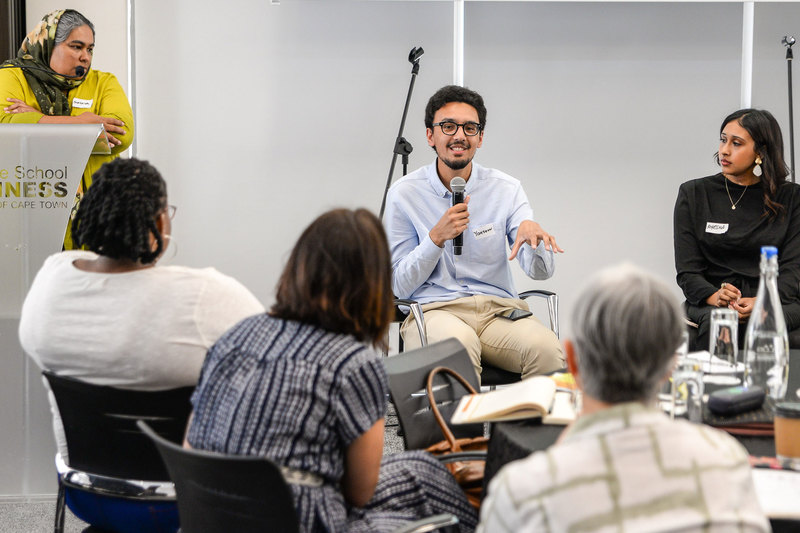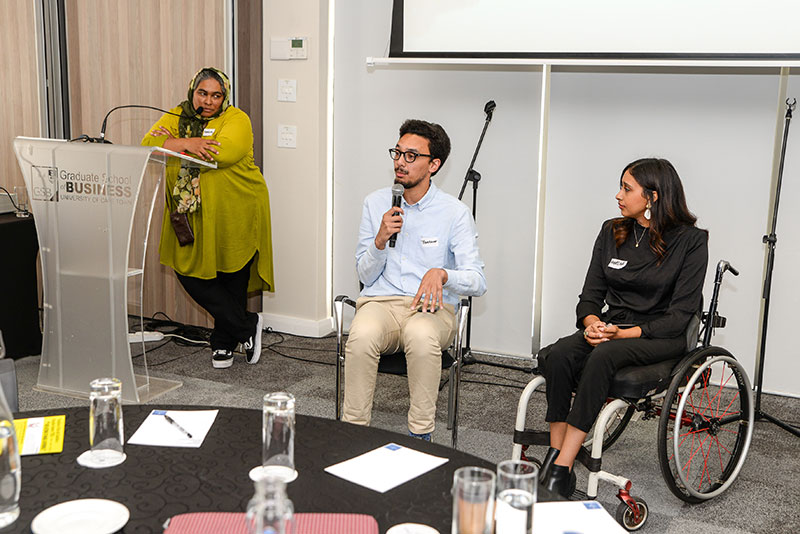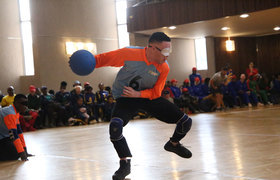Youth Month: ‘My world in words’
14 June 2023 | Story Helen Swingler, Yaaseen Samuels. Photos Je’nine May. Read time >10 min.
University of Cape Town (UCT) alumnus Yaaseen Samuels has spent most of his life in a war with words. A speech impediment from a young age – he has a stutter – has shaped him profoundly. But the disability activist wants the world to know that pity doesn’t cut it. Those living with disabilities need support: at home, school and university, and especially in the workplace. The master’s graduate from Surrey Estate shared his story with UCT News in Youth Month.
Helen Swingler (HS): When did you and your parents first become aware that you experienced speech difficulties?
Yaaseen Samuels (YS): According to my mother, who, with my sister, is my biggest supporter and counsel, a stutter was detected at the age of six when I began primary school. I was never fully aware of my stutter at the time, but in my later primary school years, it became more apparent that I spoke ‘differently’ to my classmates.
HS: Was a medical diagnosis made or was this accepted as “the way things are”?
YS: After consultation with a paediatrician [who diagnosed the problem], it was recommended that I attend speech therapy, [which I did] until I commenced high school in 2008. I recall my mom’s words when it was later decided that I should no longer attend speech therapy, due to financial constraints and a lack of progress: “Now you should try to work on your stutter by yourself.”
“A local stuttering myth exists in my community, and particularly in my family, that if a baby’s hair is cut too early after childbirth, that child will stutter.”
In 2022, at the Transitions of Youth with Disabilities in Education Systems symposium [hosted at UCT], I was approached by an attendee, a qualified speech therapist. In short, the engagement with the speech therapist proved reflective, and I am [now] fully in touch with my disability. Being able to have had that additional professional insight, after so many years, highlighted the value of therapy as a building block to internal dialogue, and eventual acceptance.
As an interesting side point, a local stuttering myth exists in my community, and particularly in my family, that if a baby’s hair is cut too early after childbirth, that child will stutter. Others believed that I was tickled too much under my feet, resulting in my stutter. Throughout my childhood these myths were what I accepted as the cause of my stutter.
HS: Is it true for you that because you have no outwardly noticeable disability, yours becomes an ‘invisible’ or discounted disability?
YS: Correct. Stuttering is [treated as] an invisible disability. Unfortunately, this results in a generalisation of disability, where unnoticeable disabilities like stuttering get isolated and ‘inferiorised’, to the extent that one’s lived experiences are relegated in comparison to more noticeable disabilities. I once participated in a disability awareness discussion as part of a youth show and was told by a fellow participant, who was physically disabled, that the challenges associated with my disability were less constraining than his. I questioned the rhetoric surrounding defining and imagining disability. This has formed the basis of my advocacy stance on awareness, and disability as a personal journey of lived experiences.
HS: How did this reality affect you, your social and emotional development, your sense of self and agency in the world?
YS: It has shaped my social and emotional development since the age of six to this day. My stutter is a part of me, to the extent that I regard it as a lifetime companion. ‘We’ have been through all that life has thrown at us – the highs and the lows.
Before starting my university journey of self-discovery and advocacy, I struggled to accept and adapt to my disability and as a result I was bullied and mocked by classmates, and worst of all, by family members. This childhood trauma made me dependent on my parents, especially my mother and grandparents, and most especially my late grandfather, who usually came to school to confront teachers and/or students who poked fun at me. [It] resulted in me developing a distrust towards adults. Because of my experiences as a stutterer, my parents and grandparents shielded me from the realities of life.
HS: What happened when you got to UCT?
YS: UCT was the highlight of my life. It provided the vehicle for disability self-discovery, self-awareness, self-acceptance and advocacy. These years nurtured my personal and academic development.
“It awoke my sense of self-awareness in relation to my disability, and instilled greater acceptance.”
Although challenging at first, before I became actively involved in the UCT Disability Service (DS), it awoke my sense of self-awareness in relation to my disability, and instilled greater acceptance. This increased my overall confidence and activism (in my own right). It enabled stuttering to become a part of me, and not me a part of stuttering.
I am eternally grateful to the DS’s Denise Oldham and the team for their selflessness in providing the best support possible to students with disabilities. It was the DS that enabled me to find my voice, both figuratively and literally. Given my disability, I never sat in the cafeteria with friends, instead, I would walk past it and make my way up to the DS, which became my second home. Being able to interact with peers from the DS, through sharing experiences related to our disabilities and learning from these, proved invaluable. Before UCT, I had never interacted with a person with a disability, [because of] my sheltered and shielded childhood. UCT made this personal journey possible.
I am also immensely thankful to the Mellon-Mays Undergraduate Fellowship (MMUF) programme. The recently discontinued MMUF, supervised by Kathy Erasmus and Dr Gideon Nomdo, further [facilitated] my journey of self-discovery through academia. This prestigious fellowship, which I was awarded with four others in 2016, recognises academic and leadership excellence. It developed my confidence and broadened my mind to the role of representation and identity-consciousness as tools for academic success.
With the continuous support of the DS and MMUF, I was awarded the 2020 National Bronze Medal Award for Outstanding Master’s Research (by full dissertation) from the Society of South African Geographers for which I am truly humbled and honoured. In 2022, I was granted a [potentially] life-changing opportunity to pursue a master’s degree in geospatial data analysis at University College Dublin (UCD) in Dublin, Ireland. Unfortunately, I had to decline that due to lack of funding.

HS: As a guest speaker at the Transitions of Youth with Disabilities in Education Systems (TYDES) seminar at UCT in December 2022, you described your difficulties in the workplace; impatient colleagues and being sidelined even though you had ideas and were keen to participate.
YS: Correct. I resigned [two jobs] because of work-related stress and emotional pressure associated with my disability. One of my most unpleasant disability-related life experiences was in the work environment. The incident was fuelled by the suppressed emotions I was experiencing when communication became a major constraint. In short, I had to attend a meeting, but prior to this my overseer was instructing me on a task that I needed clarity on. As I was [talking] to her, she became confused about what I was saying, given my impairment. I could no longer bear the suppressed emotions.
“I went to the bathroom and cried like never before, crouched on the toilet cubicle floor with my back against the wall. This incident ‘toddlerised’ me.”
I went to the bathroom and cried like never before, crouched on the toilet cubicle floor with my back against the wall. This incident ‘toddlerised’ me, physically and emotionally. I felt I could no longer continue and yearned for shielding. I went back to my desk, and asked to leave for home, as I was “not feeling well”. My overseer encouraged me not to leave as the meeting was about to start. I apologised and left, just to resign with immediate effect.
Another experience saw one of my two employers ridiculing my struggles to adapt to the work environment. The other found the communication constraints a burden and confronted me for not doing enough to engage them on practical steps to address this, which shifted the blame to me. The reason for not engaging them was due to their bullying and condescending behaviour, which took me back to that childhood mistrust of adults. Thankfully, we parted ways after a few months.
These scarring experiences demonstrate the realities of the workplace, where company targets and profits are placed above employee wellness, particularly that of disabled employees. It was clear to me that the realities of life do not begin when you commence your tertiary studies, but rather when you enter the work environment. In this environment, where there is no support for people with disabilities, employers and colleagues prey on one’s weaknesses.
On the day of the TYDES symposium, the highlight of the past three years, I wept when I saw the DS staff, as I was transported back to my university years, which were [characterised by] support and confidence.
HS: Where are you working now?
YS: I am currently working in the public sector as a graduate intern in climate change adaptation and implementation.
HS: How has this experience been?
YS: It is difficult as communication remains a major challenge when speaking to colleagues or during virtual meetings. At times, it is a struggle to get through the day, but I persevere. I am, however, thankful for being allowed to work from home two days a week, which the previous two companies did not allow. Working from home is convenient and lessens the constraints of the work environment. It also instils more comfort and calmness, which allows me to tackle the day more easily.
HS: Many people avoid others living with disabilities because they simply don’t know how to deal with situations where they’re uncomfortable, unsure or afraid of making fools of themselves.
YS: I fully agree. In my experience, whenever I engage with new people and they notice that I stutter, they automatically try to relate by referring to someone they know who stutters, which is quite annoying. [So please don’t] try to relate to anyone with a disability.
According to a quote from a painting that once hung on the wall of the reception area in the old DS premises, “People with disabilities don’t want your pity, but your support.” Treat people with disabilities as you would like to be treated, but do ask them [first], if you think that assistance is needed. Similarly, if you have questions about someone’s disability, enquire whether it is permissible to ask, and do not simply assume. Finally, respect everyone’s lived experiences.
HS: Are we doing enough as a society to embrace and include people with disabilities? What could schools and universities be doing better?
YS: No to the first question. In response, I echo the words of my mother, “It would take a lifetime to accept people with disabilities.” From personal experiences within the work environment, people with disabilities are used as pawns to comply with employment regulations, with very little to no support offered once they are employed. Spaces of learning, schools, colleges and universities play a vital role in driving the disability agenda, by amplifying the realities faced on the ground. I would like to see practical and consistent efforts towards change, shifting from closed-door engagements to public realisation.
“Universities should continue to invest financially in disability support services like the DS, as they are given too little credit for their enormous task of providing disability access.”
The role of schools should be to prioritise disability awareness education from the foundation phase through interactive learning, with the aim of highlighting that people with disabilities are not different, but merely differently abled. As a staunch proponent of sign language, [I believe] it should be introduced at the foundation level, and elevated to a potential half-year subject in the senior grades.
Universities should continue to invest financially in disability support services like the DS, as they are given too little credit for their enormous task of providing disability access. Again, promote sign language at universities and colleges as an accredited course, and mandate it for certain fields of study like human resource management, education, teaching, media and communication.
HS: Taking stock of where you are now, what are your plans and hopes for the future?
YS: This has been the hardest question to answer, all things considered. My immediate response is that it is too early to say. In my current state of mind, it is quite a sensitive question, but certainly an important one.
Being unable to realise my dream of studying and working abroad (in Ireland), [was a major blow to my aspirations and confidence]. However, I still aspire to return to academia and pursue study and work opportunities abroad.
I hope to attain happiness and contentment in whichever opportunity comes my way. In an ideal world, the work environment would be one of support and understanding for people with disabilities. Despite my personal trials, I seek to continue with disability advocacy and awareness in my own way.
I was once asked if I would ever consider authoring on stuttering. This is certainly not far-fetched, and I already have a title in mind, “Me, My Stutter and I”.
HS: In Youth Month do you have a message you’d like to convey to other young South Africans facing similar challenges?
YS: Considering the weight of this question, I would answer in one sentence: Remember your worth and persevere, because you are strong.
Note: To aid fluency and reflect Yaaseen’s views, this interview was conducted via email and followed up in a virtual interview. Those who want to contact Yaaseen should email Helen.Swingler@uct.ac.za.
 This work is licensed under a Creative Commons Attribution-NoDerivatives 4.0 International License.
This work is licensed under a Creative Commons Attribution-NoDerivatives 4.0 International License.
Please view the republishing articles page for more information.










